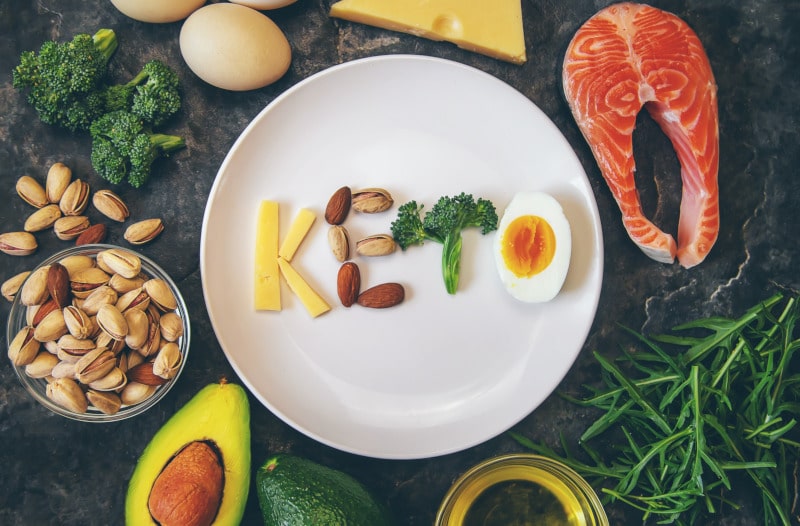The ketogenic diet, or “The Keto Diet,” is a nutritional approach that relies on significantly reducing carbohydrate consumption and increasing fat and protein intake. This change leads the body to enter a state of ketosis, in which it uses fat as its primary source of energy.
During this process, the body produces ketones that allow it to transform fat into fuel, which can help lower blood sugar levels and improve insulin sensitivity.
PlanEAT is a free nutrition app ideal for those who want to follow a personalized diet, such as the Keto diet. With its intuitive interface, it allows you to adjust your daily meals, ensuring you get all the essential nutrients while reducing carbohydrates and maximizing healthy fat intake.
Content
Everything You Need to Know About the Keto Diet
What Foods Can Be Included in the Ketogenic Diet?
Foods to Avoid on the Keto Diet
Potential Benefits of the Keto Diet
2. Improvements in some health conditions

Everything You Need to Know About the Keto Diet
It is essential to be well informed before starting a Keto diet, as it is important to know its effects and how it can impact your health. As it is a dietary plan that can vary from person to person, it is best to go to a professional to adapt this eating style to your personal needs and goals.
What Foods Can Be Included in the Ketogenic Diet?
On the ketogenic diet, foods allowed are those rich in healthy fats and proteins, with a minimal amount of carbohydrates. The goal is for the body to use ketones as an energy source.
Below are some examples of foods that are part of this eating plan:
- Healthy fats : Olive oil, butter, coconut oil, and other natural fats that you can incorporate into your meals or use for cooking.
- Fish and seafood : Fatty fish, such as salmon, tuna, sardines and mackerel, are ideal because of their high content of healthy fats and proteins.
- Red meats : You can eat meats like beef, lamb, pork, or horse. Ideally, you should choose grass-fed animals and avoid processed meats. However, it is important to moderate the amounts, since the Keto diet focuses more on fats than proteins.
- Eggs : They are an excellent source of protein and fat. You can prepare them in different ways: boiled, fried in butter, scrambled or in omelettes.
- Cheeses : Especially those that are high in fat.
- Vegetables : It is preferable to choose those that grow above ground, such as spinach, broccoli or avocado, as they contain fewer carbohydrates.
- Low-carb foods : The general rule is that they contain less than 5% carbohydrates.

Foods to Avoid on the Keto Diet
Some high-carb foods are not compatible with the ketogenic diet. Here are some you should avoid:
- Fruits : Although healthy, many fruits contain natural sugars and carbohydrates, making them incompatible with the Keto diet.
- Root vegetables : Potatoes, sweet potatoes, carrots and other root vegetables are high in carbohydrates.
- Cereals and derivatives : Pasta, rice, bread and other cereal-based products, including whole grains, should be eliminated due to their high carbohydrate content.
- Legumes : Although they are rich in vegetable proteins, they contain too many carbohydrates for this diet.
- Sugars and processed foods : You should avoid sugar, soft drinks, pastries, cookies, commercial sauces and other processed products that are high in carbohydrates.
Potential Benefits of the Keto Diet
The keto diet is not only popular for those looking to lose weight, but it may also offer potential health benefits under certain conditions. Here are some of them:
1. Weight loss
By drastically reducing carbohydrates and increasing fat consumption, the body is forced to use its fat reserves for energy. This can lead to a significant reduction in body fat, including visceral reserves, which are the most dangerous. In addition, foods rich in fat and protein generate greater satiety, which can contribute to eating less effortlessly.
2. Improvements in some health conditions
Although more research is needed, some studies suggest that the ketogenic diet may be beneficial for certain diseases.

- Type 2 Diabetes : Reducing carbohydrates improves insulin sensitivity and may help control blood glucose levels.
- Epilepsy : The Keto diet has been used to reduce seizure frequency, especially in children with epilepsy.
- Neurodegenerative diseases : Conditions such as Alzheimer’s or Parkinson’s may benefit from the neuroprotective effects of ketone bodies, although further studies are still required.
- Cancer : Although the keto diet has not been shown to prevent cancer, reducing sugars may help slow the growth of certain cancer cells.
Final Considerations
While the keto diet may offer some benefits, it is not without potential risks. Excluding certain foods can lead to malnutrition if not done properly. It is essential to ensure that your body receives the necessary vitamins and minerals, so it is advisable to follow this type of diet under the supervision of a nutritionist.
In addition, PlanEAT, the free Nutrition APP , offers nutritional advice based on your specific needs, creating a balanced eating plan tailored to your goals. Whether you want to lose weight or improve your general well-being, this tool becomes a fundamental ally for following a ketogenic diet effectively and safely.
Each person reacts differently to changes in diet, and therefore, before embarking on a keto diet, it is key that you seek the advice of a professional who can adapt this eating plan to your personal needs and goals.

